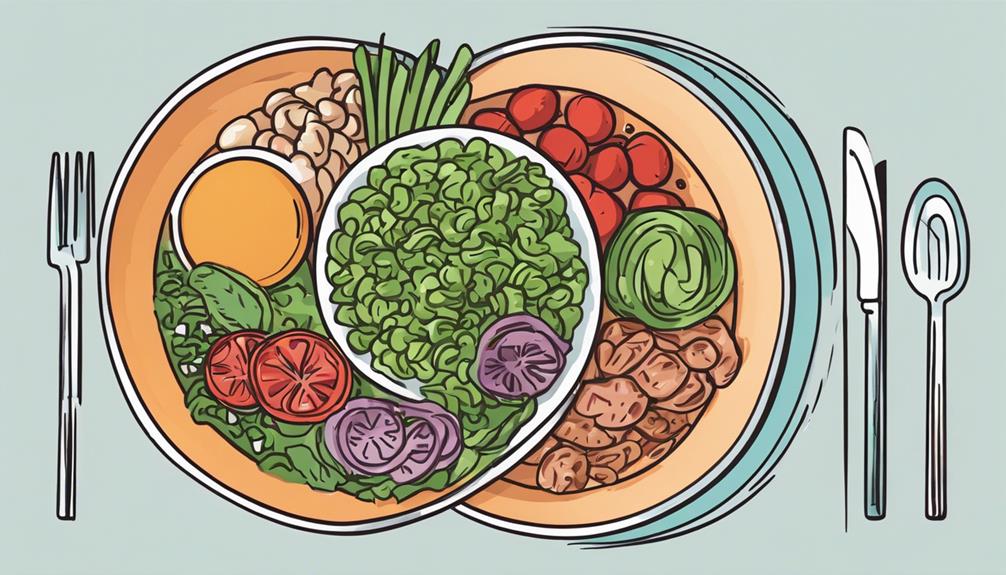Imagine your body as a finely tuned machine, where the fuel you provide determines its performance. When it comes to preventing diabetes, the food choices you make play a crucial role in maintaining optimal health. Understanding the impact of your dietary decisions can be the key to a healthier future.
By focusing on balanced nutrition, incorporating fiber-rich foods, and being mindful of your carbohydrate and fat intake, you can take proactive steps towards effective diabetes prevention. But there's more to it than just that – delve into the nuances of dietary strategies for a comprehensive approach to safeguarding your well-being.
Key Takeaways
- Prioritize nutrient-dense foods for stable blood sugar levels.
- Include fiber-rich foods to slow sugar absorption and support gut health.
- Opt for low GI carbohydrates like whole grains to prevent spikes in blood sugar.
- Choose healthy fats like omega-3 sources for improved insulin sensitivity and heart health.
Importance of Balanced Nutrition

Ensuring a well-rounded diet is essential for maintaining stable blood sugar levels and overall health when aiming to prevent diabetes. When considering the importance of balanced nutrition, focus on nutrient density and thoughtful meal planning.
Nutrient-dense foods provide a high amount of vitamins, minerals, and other beneficial nutrients relative to the number of calories they contain. Including these foods in your meals can help regulate blood sugar levels and support optimal health.
Meal planning is a key component of achieving a balanced diet. By planning your meals in advance, you can ensure that you're consuming a variety of nutrients throughout the day. Aim to include a mix of lean proteins, whole grains, fruits, vegetables, and healthy fats in each meal. This approach can help prevent spikes and crashes in blood sugar levels, promoting overall well-being.
Role of Fiber in Diet
When aiming to understand the role of fiber in your diet for diabetes prevention, consider its significant impact on blood sugar regulation and overall health. Fiber is a crucial component of a balanced diet that offers various benefits for both diabetes prevention and overall well-being. One key advantage of fiber is its ability to slow down the absorption of sugar in the bloodstream, helping to prevent spikes in blood glucose levels. Additionally, fiber promotes gut health by acting as a prebiotic, supporting the growth of beneficial bacteria in the gut.
Including an adequate amount of fiber in your daily meals can help regulate your blood sugar levels and reduce the risk of developing diabetes. Foods rich in fiber include fruits, vegetables, whole grains, legumes, nuts, and seeds. By incorporating these fiber-rich foods into your diet, you can't only support your gut health but also improve your overall health and well-being. Remember, small changes like adding more fiber to your meals can have a significant impact on your diabetes prevention efforts.
Impact of Carbohydrate Consumption

To understand the impact of carbohydrate consumption on diabetes prevention, consider its direct influence on blood sugar levels and overall metabolic health. When it comes to managing your carb intake to prevent diabetes, paying attention to the glycemic index of the carbohydrates you consume is crucial.
Here are three key points to keep in mind:
- Glycemic Index: Opt for carbohydrates with a low glycemic index, such as whole grains, legumes, and non-starchy vegetables. These foods cause a slower rise in blood sugar levels, helping to maintain stable glucose levels over time.
- Sugar Intake: Be mindful of your sugar intake, as excessive consumption of sugary foods and beverages can lead to spikes in blood sugar levels. Choose natural sources of sweetness like fruits or opt for sugar substitutes to reduce the impact on your blood sugar.
- Balanced Choices: Strive for a balanced approach by including a variety of nutrient-dense carbohydrates in your diet while moderating portions to maintain a healthy weight and prevent insulin resistance.
Significance of Healthy Fats
Healthy fats play a crucial role in supporting various aspects of metabolic health and overall well-being. Omega-3 sources, such as fatty fish like salmon and flaxseeds, are essential for reducing inflammation, improving heart health, and enhancing insulin sensitivity. Including these healthy fats in your diet can help lower the risk of developing diabetes by promoting better blood sugar control.
Avocado, a versatile fruit rich in monounsaturated fats, offers numerous benefits for diabetes prevention. Its high fiber content aids in stabilizing blood sugar levels and promoting a feeling of fullness, which can prevent overeating and support weight management.
Incorporating healthy fats into your meals not only adds flavor and satiety but also provides essential nutrients for optimal health. Swapping saturated fats for healthier alternatives like olive oil, nuts, and seeds can have a significant impact on your well-being. Remember, moderation is key when consuming fats, so aim for a balanced approach that includes a variety of sources to support your diabetes prevention goals.
Benefits of Portion Control

Controlling your portion sizes is a fundamental aspect of managing your dietary intake to support overall health and well-being. Mindful eating and being conscious of portion sizes can have numerous benefits for your health:
- Weight Management: By controlling your portion sizes, you can prevent overeating and manage your weight more effectively. Consuming larger portions than your body needs can lead to weight gain over time.
- Blood Sugar Control: Proper portion control can help regulate blood sugar levels, which is especially important for individuals at risk of diabetes. Consistently consuming large portions of high-calorie foods can spike blood sugar levels, increasing the risk of insulin resistance.
- Digestive Health: Overeating can put a strain on your digestive system, leading to issues like indigestion, bloating, and discomfort. By practicing portion control and eating the right amount of food for your body's needs, you can support better digestion and overall gut health.
Frequently Asked Questions
Can Specific Foods or Dietary Patterns Completely Prevent Diabetes, or Is It More About Overall Lifestyle Habits?
You should focus on overall lifestyle habits rather than specific foods alone to prevent diabetes. Genetic predisposition plays a role, but incorporating healthy dietary choices, regular exercise, and good sleep patterns can significantly reduce your risk.
How Does the Timing of Meals and Snacks Throughout the Day Affect Diabetes Prevention?
When it comes to blood sugar control, meal timing matters. Eating at consistent times can help stabilize glucose levels. Incorporating stress management and practicing mindful eating can further support diabetes prevention by regulating blood sugar throughout the day.
Are There Any Specific Cooking Methods or Preparation Techniques That Can Enhance the Effectiveness of a Diabetes Prevention Diet?
Fire up your imagination with grilling techniques that not only bring out delicious flavor profiles but also enhance your diabetes prevention diet. Experiment with different methods to create healthy, tasty meals.
What Role Do Beverages, Such as Sugary Drinks or Alcohol, Play in Diabetes Prevention?
When it comes to diabetes prevention, your beverage choices matter. Be mindful of your sugar intake by avoiding sugary drinks. Additionally, moderate alcohol consumption to lower your risk factors. Making smarter choices daily can have a big impact on your health.
How Does Stress and Mental Health Impact the Effectiveness of Dietary Strategies for Diabetes Prevention?
When stress clouds your mind, mindful eating becomes challenging. Prioritize stress management for effective dietary strategies in preventing diabetes. Cultivate a mindful approach to food choices to combat the impact of stress on health.
Conclusion
As you navigate the winding road of diabetes prevention, remember that your dietary choices are like the compass guiding your journey.
Just as a ship needs a steady hand at the helm to reach its destination, your body needs a balanced diet to stay on course towards optimal health.
By incorporating fiber, watching your carb intake, choosing healthy fats, and practicing portion control, you can chart a course towards a healthier, diabetes-free future.